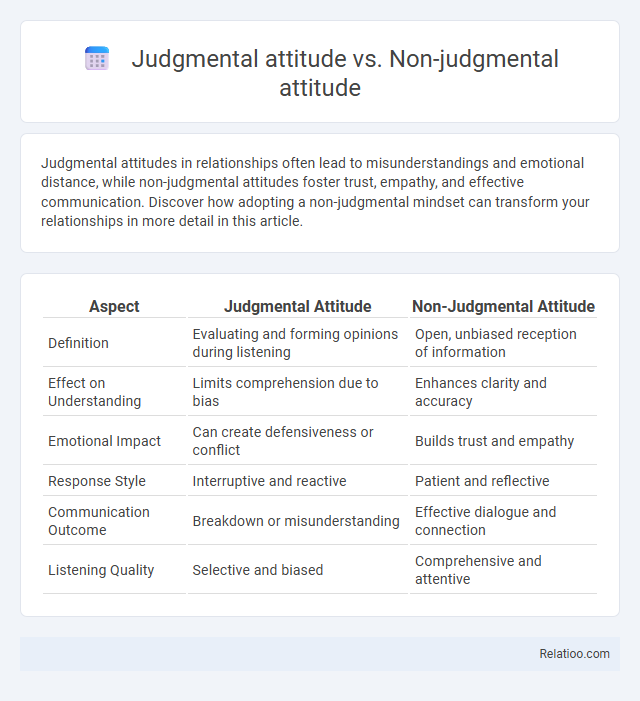Judgmental attitudes in relationships often lead to misunderstandings and emotional distance, while non-judgmental attitudes foster trust, empathy, and effective communication. Discover how adopting a non-judgmental mindset can transform your relationships in more detail in this article.
Table of Comparison
| Aspect | Judgmental Attitude | Non-Judgmental Attitude |
|---|---|---|
| Definition | Evaluating and forming opinions during listening | Open, unbiased reception of information |
| Effect on Understanding | Limits comprehension due to bias | Enhances clarity and accuracy |
| Emotional Impact | Can create defensiveness or conflict | Builds trust and empathy |
| Response Style | Interruptive and reactive | Patient and reflective |
| Communication Outcome | Breakdown or misunderstanding | Effective dialogue and connection |
| Listening Quality | Selective and biased | Comprehensive and attentive |
Understanding Judgmental Attitude
Understanding judgmental attitude involves recognizing a tendency to form opinions quickly and often harshly without considering context or others' perspectives. This mindset limits empathy and opens the door to misunderstandings, impacting your relationships and decision-making processes negatively. Adopting a non-judgmental attitude fosters open communication, promotes inclusivity, and enhances emotional intelligence by encouraging acceptance and curiosity rather than bias.
Defining Non-Judgmental Attitude
A non-judgmental attitude involves approaching situations and people without forming immediate opinions or biases, fostering empathy and open-mindedness. Unlike a judgmental attitude that quickly labels or critiques, a non-judgmental stance promotes understanding and respectful communication. Developing Your non-judgmental approach encourages growth, stronger relationships, and mental well-being by reducing conflict and fostering acceptance.
Key Differences Between Judgmental and Non-Judgmental Attitudes
Judgmental attitude involves forming opinions quickly, often based on personal biases, which can lead to misunderstandings and conflict. Non-judgmental attitude emphasizes openness and acceptance, promoting empathy and effective communication by withholding immediate criticism. Key differences include the approach to others' behaviors: judgmental perspectives evaluate and categorize, while non-judgmental perspectives seek to understand and support without bias.
Psychological Roots of Judgmental Behavior
Judgmental attitudes often stem from deep-seated psychological factors such as insecurity, fear of vulnerability, and a need for control, which drive individuals to impose rigid evaluations on others. Non-judgmental attitudes arise from emotional resilience, empathy, and self-awareness, facilitating open-mindedness and acceptance without biased assessments. Understanding these psychological roots is crucial for fostering mental well-being and promoting healthier interpersonal dynamics.
Benefits of Practicing Non-Judgmental Attitude
Practicing a non-judgmental attitude fosters emotional resilience, improves interpersonal relationships, and enhances your ability to empathize with others without bias. This mindset reduces stress and promotes mental clarity by allowing you to observe situations objectively rather than reacting impulsively. Cultivating non-judgmental awareness supports personal growth and creates a supportive environment conducive to open communication and trust.
Common Signs of Judgmental Thinking
Common signs of judgmental thinking include rapid negative evaluations, stereotyping based on limited information, and an inability to accept differing viewpoints, often leading to biased conclusions. Non-judgmental attitudes, in contrast, involve openness, empathy, and a focus on understanding rather than condemnation, promoting impartiality and tolerance. Recognizing patterns such as harsh criticism or moral superiority helps shift from judgmental to more balanced, reflective thinking.
Impact on Relationships: Judgmental vs. Non-Judgmental
A judgmental attitude often leads to misunderstandings, diminished trust, and increased conflict in relationships, as it fosters criticism and defensiveness. In contrast, a non-judgmental attitude promotes open communication, empathy, and mutual respect, strengthening emotional bonds and enhancing your ability to resolve disagreements constructively. Choosing a non-judgmental approach can significantly improve relationship quality by creating a safe space for honest expression and deeper connection.
Overcoming Judgmental Tendencies
Overcoming judgmental tendencies requires cultivating a non-judgmental attitude rooted in empathy and open-mindedness, enabling more authentic and compassionate interactions. Research indicates that mindfulness practices significantly reduce implicit biases and promote acceptance, helping individuals shift from a critical mindset to one of understanding. Embracing emotional intelligence and self-awareness further supports overcoming judgmental behaviors by fostering tolerance and reducing negative assumptions about others.
Strategies to Foster a Non-Judgmental Mindset
Fostering a non-judgmental mindset involves actively practicing empathy, mindfulness, and open-mindedness to reduce biases and assumptions. You can implement strategies such as reflective listening, self-awareness exercises, and challenging automatic negative thoughts to cultivate acceptance and understanding of diverse perspectives. Consistent application of these techniques promotes emotional resilience and healthier interpersonal relationships.
Real-Life Examples: Judgmental vs. Non-Judgmental Responses
A judgmental attitude often leads to negative responses such as criticizing a coworker for missing a deadline, whereas a non-judgmental attitude promotes understanding by asking about possible obstacles they faced. In real-life scenarios, your non-judgmental approach can foster open communication and problem-solving rather than blame. Choosing empathy over judgment transforms conflicts into opportunities for growth and collaboration.

Infographic: Judgmental attitude vs Non-judgmental attitude
 relatioo.com
relatioo.com